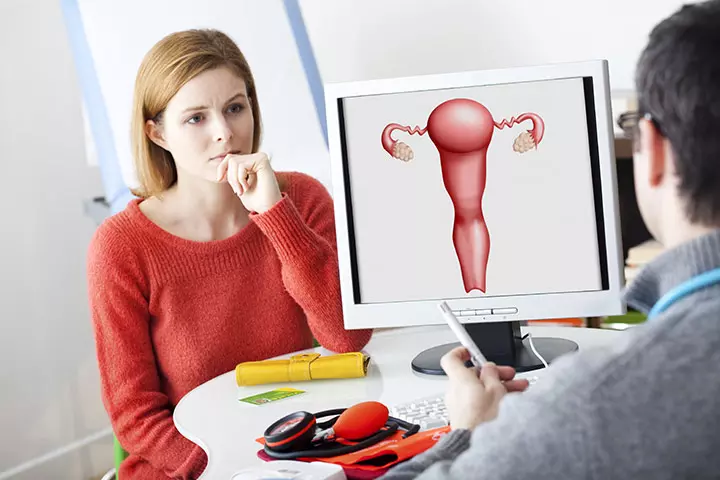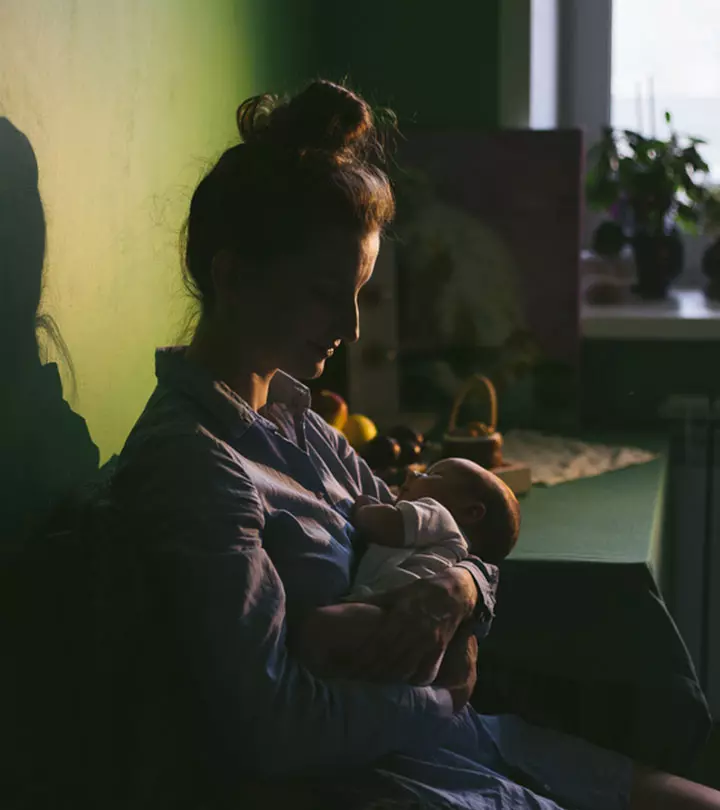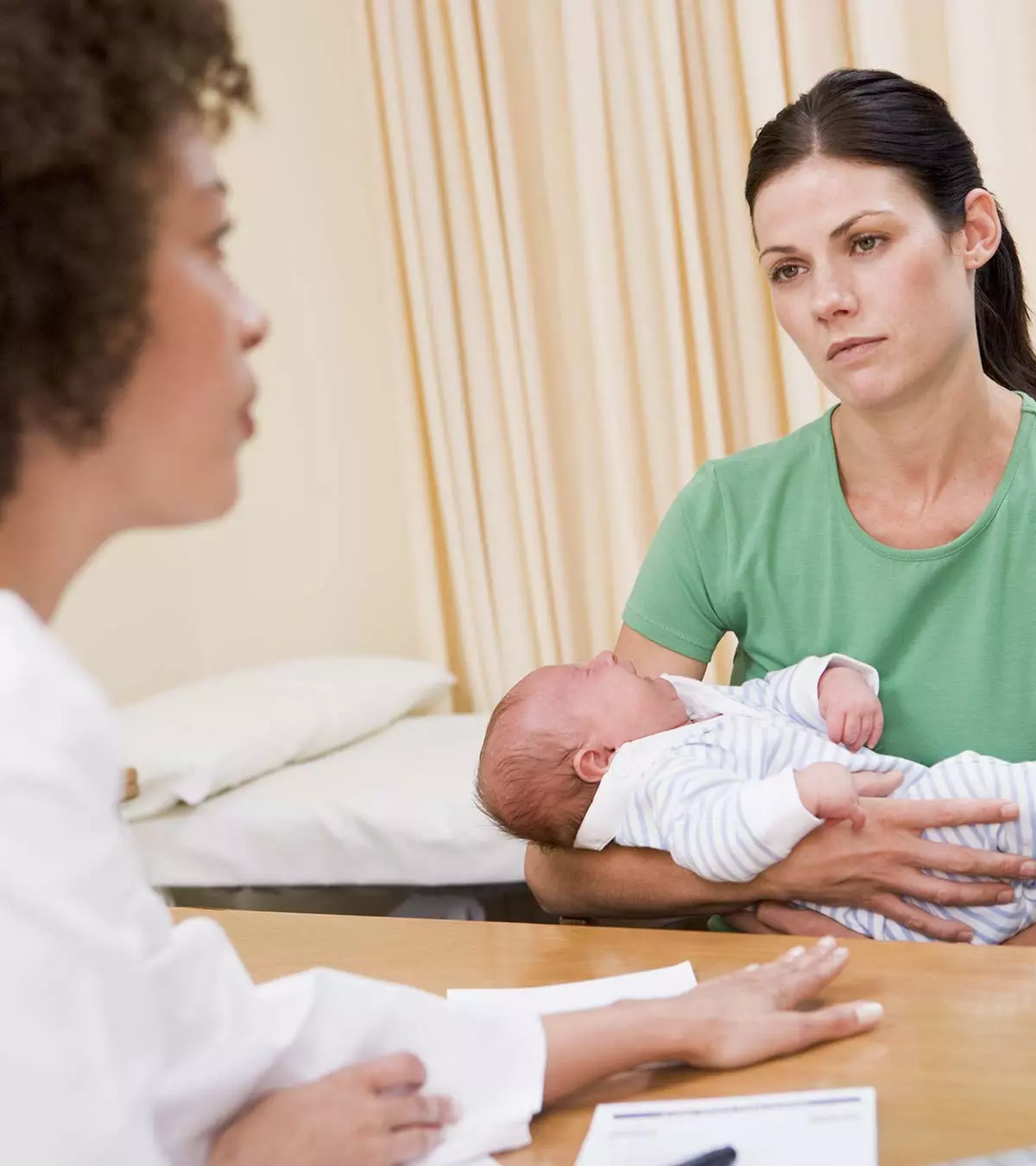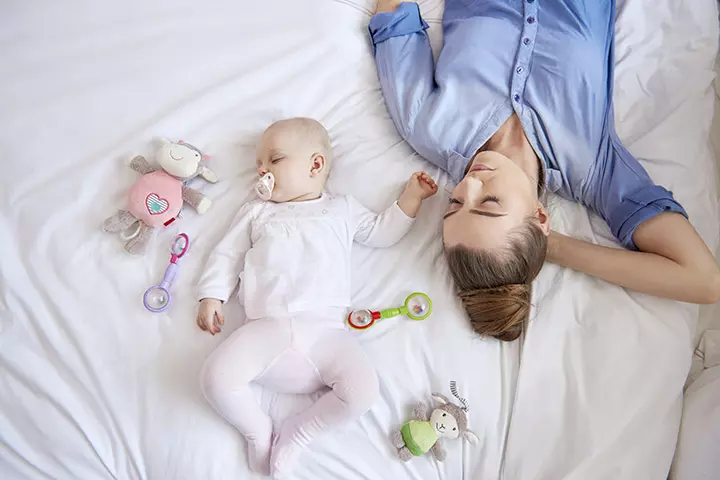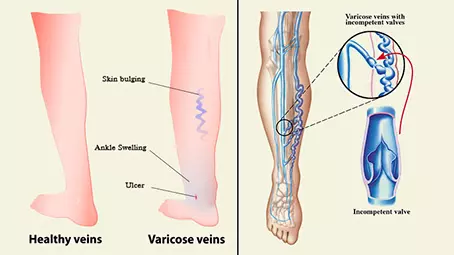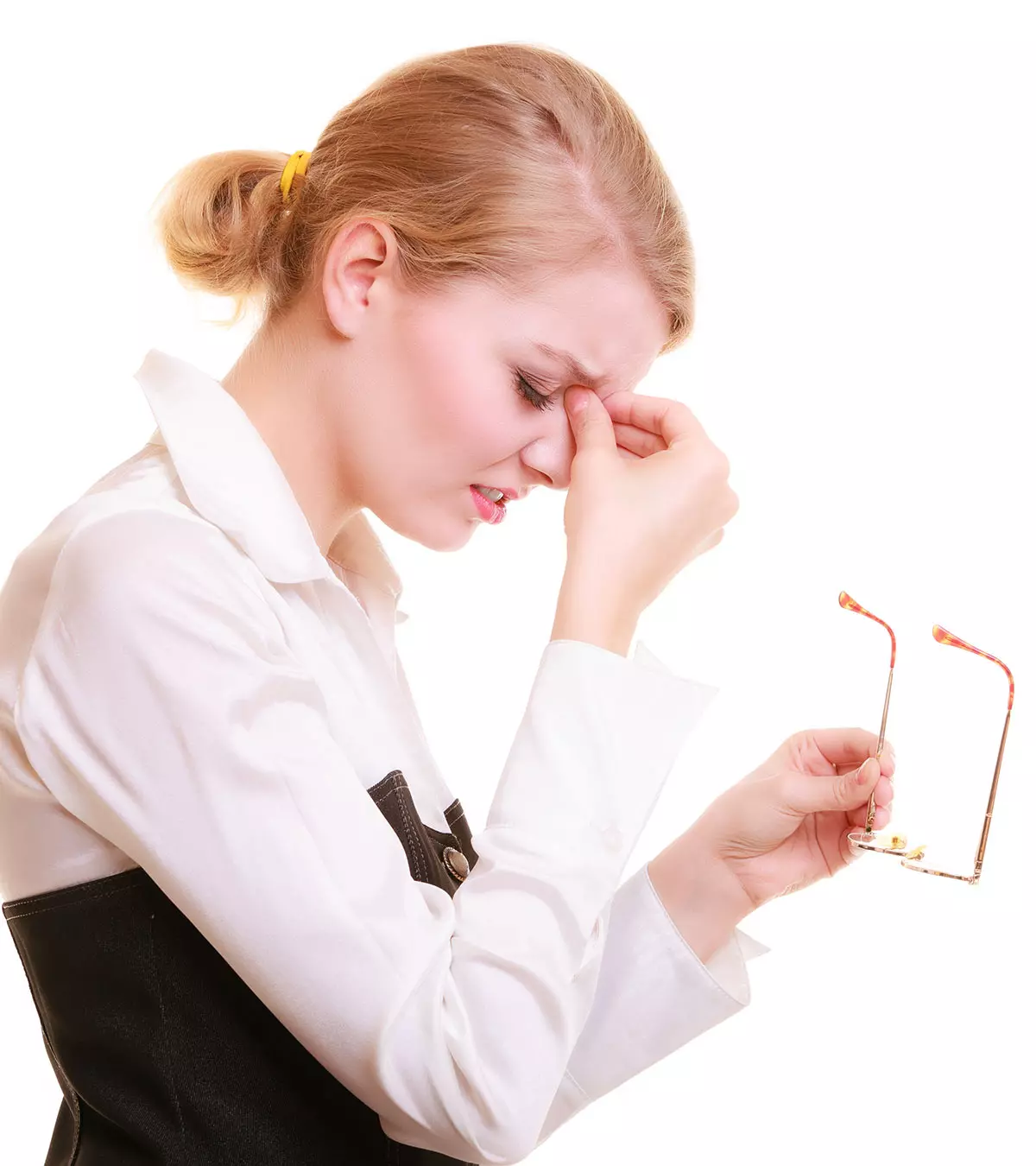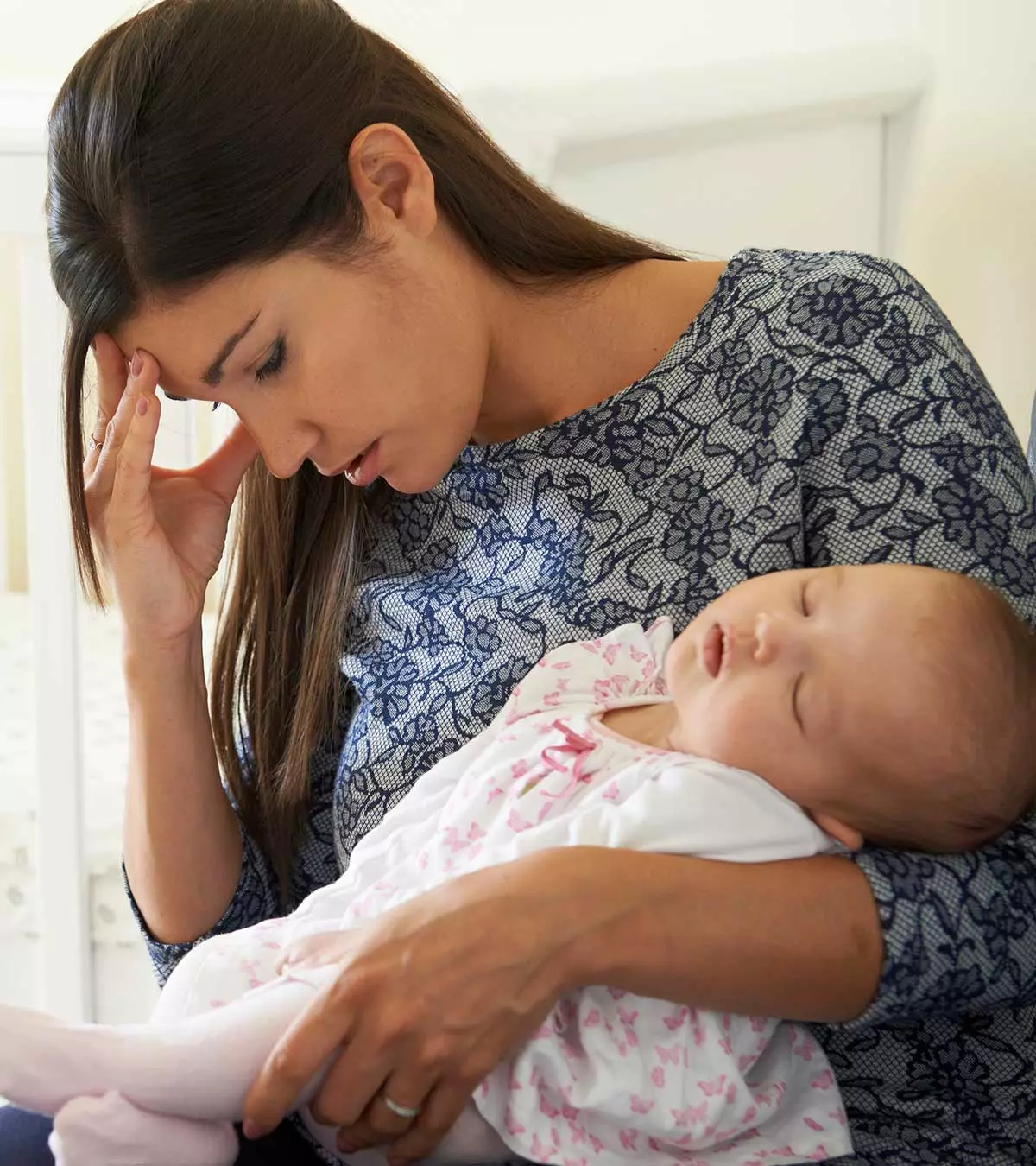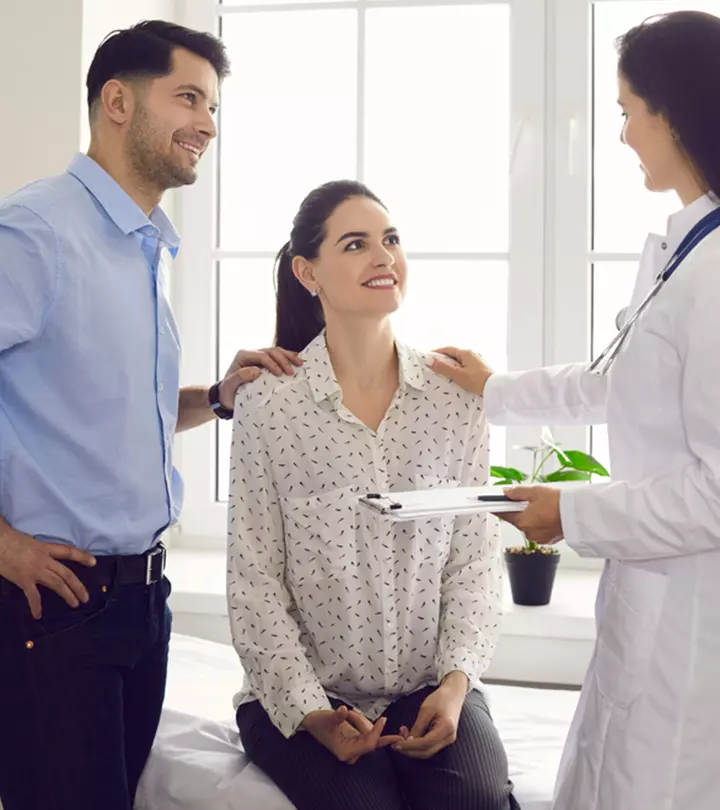
Image: Shutterstock
Postpartum rectal bleeding usually occurs due to hemorrhoids, especially common in women who have undergone a vaginal delivery rather than a cesarean delivery. Hemorrhoids or piles are referred to the inflamed or swollen veins in the areas surrounding the rectum that cause bleeding and discomfort. Some common symptoms of this condition include itching in the rectal area, pain during bowel movements accompanied by bleeding and swelling around the anal region (1). Since rectal bleeding may sometimes be confused with vaginal bleeding, it is important to be aware of this condition. Although this is a common condition, it is advised to consult your doctor and seek medical care. Read on to know more about rectal bleeding after delivery, its symptoms, treatment, and preventative methods.

Key Pointers
- Postpartum rectal bleeding occurs in women with anal fissures or hemorrhoids after a vaginal delivery and is accompanied by pain, swelling, itching, and bleeding during bowel movements.
- Anal fissures and hemorrhoids can be soothed using medicated wipes, warm baths, kegel exercises, ice compresses, cushions, and recliners.
- Over-the-counter hemorrhoid creams, stool softeners, pain relievers, and other medications can be used to alleviate symptoms.
- Home remedies such as drinking adequate water, eating fibrous foods, and exercising regularly can help prevent rectal bleeding and discomfort.
- It is crucial to seek medical attention in case of heavy bleeding, pain, change in stool color, anal discomfort or incontinence, dizziness, or shortness of breath.
Causes Of Postpartum Rectal Bleeding
The possible causes of rectal bleeding after delivery include.
- Hemorrhoids (swollen veins in the rectum and anus): Hemorrhoids are common during pregnancy, especially in the third trimester and first few weeks after delivery. These swollen veins rupture and bleed as you strain while passing a hard stool as a result of postpartum constipation or when you wipe the anal area using a tissue (2)
Natalie, a registered nurse and a mother of two recounts her experience dealing with hemorrhoids after giving birth, “I remember my first time pooping after I had given birth. I was bleeding from my butt hole. I was mortified. Fortunately, I didn’t have to deal with my hemorrhoids for too long. They lasted for about two months postpartum. There were times when I was afraid to use the washroom. I would use any excuse to avoid sitting on the toilet, but I was wrong! The longer you wait, the worse it gets. There were many home remedies, along with a topical drug prescription, that I used to relieve the pain of hemorrhoids. But my only saving grace was water. In my case, increasing my water intake helped soften my stool, so it was way easier to pass (the stool), and I didn’t have to strain as much (ⅰ).’’
- Anal fissures: Hard stools could also cause cracks in the skin around the anus, known as anal fissures. These could be painful and cause bleeding (3).
Mya Bellinger, a qualified medical practitioner specializing in internal medicine, immunologyiThe medical study of the immune systems , and gynecology, suggests, “Straining to poop may cause postpartum hemorrhageiA rare yet serious condition characterized by excessive bleeding after giving birth . This may be a result of constipation, which can make the swollen rectal veins bleed. Straining may also result from hard stools, resulting in anal fissures and bleeding.”
 Research finds
Research findsTherefore, if you have a history of rectal bleeding before pregnancy due to hemorrhoids or anal fissuresiA painful tear in the lining of the anus causing painful bowel movements and bleeding , inform the obstetrician so that he/she can suggest you medical management for the same as the condition can get aggravated post delivery.
How To Deal With Postpartum Rectal Bleeding?
Here are some of the ways to manage hemorrhoids and anal fissures and soothe postpartum rectal bleeding (2) (4).
- Try a warm water bath. You may use a sitz bath, which is a small water tub that fits over the toilet seat. Sitting in the sitz bath for about 10 to 15 minutes after each bowel movement or for two to three times a day could soothe irritation. Add Epsom salt to water to help reduce swelling and pain.

You can also soak yourself in a bathtub. Relax the anal muscles while soaking in the bathtub. It helps maximize the blood flow and speed up healing. It can also lower the pain associated with bowel movements.
- Apply ice compress (wrap some ice in a clean cloth) on the hemorrhoids and leave it for about ten minutes. This helps reduce swelling and discomfort. Alternate between hot and cold treatments — begin with ice compress and follow it up with a warm sitz bathiA warm, shallow bath used to sit and relieve discomfort in the perineal region (15) (16).
- Clean the anal region using a soft and unscented tissue. You may also use medicated wipes or moist the tissue with witch hazel to speed up the healing process.
- Practice kegel exercisesiA set of exercises that strengthen the pelvic floor, improve bowel control and urinary continence as they could help improve blood circulation in the rectal tissue region and the perineumiA thin skin membrane between the genitalia and anus . They also help tone the vaginal and pelvic-flooriThe muscles controlling the functions of the uterus, bowels, bladder, and rectum muscles (5).

- Sit on a soft cushion or a pillow to get relief from the rectal pressure. Sitting on a recliner or a rocking chair is likely to be more comfortable than sitting on a straight-backed chair. Doughnut pillows are very helpful in this situation (16).
- Limit activities that induce rectal pressure. Hemorrhoids generally occur due to the pressure exerted on the rectal area. The risk factors are likely to be obesity, lifting of heavy items, constipation, straining to have a stool, or sitting on the toilet seat for a prolonged period.
- Do not control the urge to pass stool as it could aggravate the pain and discomfort caused by hemorrhoids and make the stools dry.
- Limit the time spent in the toilet as sitting for a long time puts pressure on the rectal veins, which could increase bleeding.
- Use over-the-counter hemorrhoid creams, suppositoriesiDosage in the form of a substance that dissolves or melts in a bodily opening to distribute medicine , ointments, or sprays after consulting a doctor. They could relieve itching and discomfort in the rectal region.
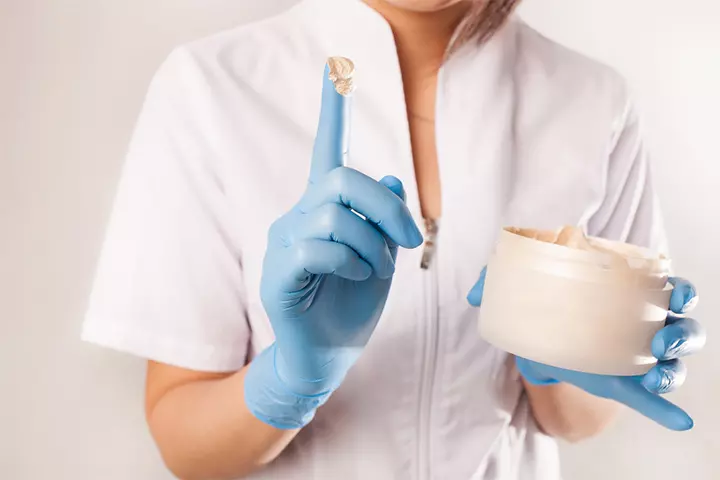
- Address constipation by including high-fiber foods in your diet and drinking enough water. These could ease constipation and reduce the discomfort caused by hemorrhoids and rectal bleeding.
Dr. Ila Dayananda, board-certified obstetrician/gynecologist from Brooklyn, New York, says, “Postpartum hemorrhoids can go away on their own, especially if you practice keeping the affected area clean and are careful not to further strain the area. In more serious cases, rectal bleeding could mean colorectal cancer or gastrointestinal disease. Therefore, it’s important to consult your doctor when and if rectal bleeding is noticed.”
 Quick tip
Quick tipIf these home treatment measures do not provide you relief from postpartum rectal bleeding, your doctor might prescribe medicines such as stool softeners, opioidsiA category of painkillers that interact with opioid receptors in the body to relieve pain , and pain relievers.
When To See A Doctor?
Seek the help of your healthcare provider if you experience the following symptoms (17) (18):
- Significant rectal bleeding that is continuous or heavy
- Abnormal growths or infection in the anal region
- Fresh blood in your stools
- Change in the stool color
- Pain while passing stool or urinating
- Lack of control over stool passage
- Dizziness or shortness of breath
 Did you know?
Did you know?“If you are bleeding heavily or noticing blood in every stool you pass, it could be a cause of concern”, advises Mya Bellinger. Your doctor may schedule lab tests or imaging tests to determine the cause of blood in the stools.
How To Prevent Postpartum Rectal Bleeding?
Take measures to prevent constipation, which could decrease the possibility of postpartum hemorrhoids and anal fissures, the main causes of postpartum rectal bleeding (6). The following measures could help you prevent postpartum rectal bleeding.
- Drink enough water and other healthy liquids
- Eat a dietary fiber diet that includes whole-grain products, beans, cereals, fresh fruits, and vegetables in your everyday diet.

Is It Normal To Bleed When You Poop After Having A Baby?
Finding drops or streaks of blood in your postpartum poop, toilet bowl, or tissue during the first few days after childbirth is common. You may also notice it in your panty after you visit the washroom.
Frequently Asked Questions
1. Can postpartum hemorrhoids be permanent?
Postpartum hemorrhoids are not permanent and should typically shrink back in about two to four weeks. However, if the discomfort increases, you must consult your OB/GYN (11).
2. What test is done to check hemorrhoids?
Your doctor will start by taking a thorough history of your symptoms and overall health. They may then perform a physical examination to assess any visible signs. For internal hemorrhoids, they may use a tool such as an anoscopeiA plastic or metal tube with a small diameter and an obstruction for examining the anus or proctoscopeiA medical instrument with an integrated light for examining the anus and lower rectum to visually examine the inside of the rectum, colon, and anus (12).
3. Does walking help hemorrhoids?
Yes. Incorporating exercises like walking, biking, and short distance running into your routine can be helpful in managing and preventing hemorrhoids. This is because physical activity can promote regular bowel movements and alleviate digestive issues, making it an important aspect of hemorrhoid treatment (13).
4. Can postpartum rectal bleeding indicate a serious condition?
Postpartum rectal bleeding can sometimes indicate a serious condition, such as infection or a more severe complication. It’s essential to consult a healthcare provider if you experience significant or persistent bleeding.
Postpartum rectal bleeding is usually not a cause for concern. It mainly occurs due to hemorrhoids (swollen veins in the rectum and anus) and anal fissures. However, it is advisable to seek the help of your doctor if you notice severe symptoms, including constant and heavy bleeding. Also, taking measures to prevent constipation will decrease the possibility of postpartum hemorrhoids and anal fissures. You can address constipation and other discomforts that follow it by including fiber-rich foods in your diet and drinking ample water.
Infographic: What Are Common Anorectal Symptoms In Postpartum?
Identifying and treating anorectal symptoms on time during postpartum can prevent complications such as hemorrhoidal prolapse or clotting. These symptoms can also be seen in the early stages of conditions requiring treatments. Go through the infographic to know common anorectal symptoms in postpartum.
Some thing wrong with infographic shortcode. please verify shortcode syntax
Illustration: Ways To Cure Postpartum Rectal Bleeding (Blood In Stool)
_illustration.jpg.webp)
Image: Dalle E/MomJunction Design Team
Grasp a deeper understanding of postpartum hemorrhage, a critical childbirth complication characterized by excessive bleeding. Expand your knowledge on its origins and treatment strategies through this enlightening video.
Personal Experience: Source
MomJunction articles include first-hand experiences to provide you with better insights through real-life narratives. Here are the sources of personal accounts referenced in this article.
ⅰ. Hemorrhoids – There, I said it!https://fleetingmomentshomeblog.wordpress.com/2019/08/02/hemorrhoids-there-i-said-it-pregnancy/
References
- What to Know After Having Your Baby (if you had a vaginal birth); UNM Hospitals
https://hsc.unm.edu/health/patient-care/womens-health/doc/patient-education/postpartum-vaginal-birth-english.pdf - Common Conditions; University of Rochester Medical Center
https://www.urmc.rochester.edu/ob-gyn/obstetrics/after-delivery/common-conditions - Hemorrhoids and what to do about them; Harvard Health Publishing
https://www.health.harvard.edu/diseases-and-conditions/hemorrhoids_and_what_to_do_about_them - Donna Freeborn et al.; Hemorrhoids and Varicose Veins in Pregnancy; University of Rochester Medical Center
https://www.urmc.rochester.edu/encyclopedia/content?contenttypeid=134&contentid=9 - Richard Burney; Thrombosed External Hemorrhoids; Michigan Medicine
https://www.med.umich.edu/1libr/Surgery/GenSurgery/ThrombosedHem.pdf - Stool Softeners; NIH (2018)
https://medlineplus.gov/druginfo/meds/a601113.html - Meghan Duck; Postpartum Assessment and Common Postpartum Complications: Pain management Urinary Retention & Hematoma; UCSF Benioff Children’s Hospital (2018)
https://bchsfoutreach.ucsf.edu/sites/bchsfoutreach.ucsf.edu/files/handouts/Washington%20Hospital%20Postpartum%204-2018.pdf - Meredith Portalatin and Nathaniel Winstead; Medical Management of Constipation; Clin Colon Rectal Surg (2012)
https://www.ncbi.nlm.nih.gov/pmc/articles/PMC3348737/ - Treatment of Hemorrhoids; NIH (2016)
https://www.niddk.nih.gov/health-information/digestive-diseases/hemorrhoids/treatment - Hemorrhoids What Is It; Harvard Health Publishing (2019)
https://www.health.harvard.edu/diseases-and-conditions/hemorrhoids-a-to-z - Beginning: Pregnancy Birth and Beyond; Allina Health
https://www.allinahealth.org/health-conditions-and-treatments/health-library/patient-education/beginnings/your-recovery-at-home/your-changing-body - Diagnosis of Hemorrhoids; NIH
https://www.niddk.nih.gov/health-information/digestive-diseases/hemorrhoids/diagnosis - 5 Simple Ways To Prevent Hemorrhoids; Cleveland Clinic
https://health.clevelandclinic.org/5-simple-ways-you-can-prevent-hemorrhoids - Diana Bužinskienė et al.; (2025); Perianal Diseases in Pregnancy and After Childbirth: Frequency, Risk Factors, Impact on Women’s Quality of Life and Treatment Methods.
https://www.frontiersin.org/journals/surgery/articles/10.3389/fsurg.2025.788823/full - Recovering From Delivery; Nemours Children’s Health
https://kidshealth.org/en/parents/recovering-delivery.html - Postpartum Pain Management; American College of Obstetricians and Gynecologists
https://www.acog.org/womens-health/faqs/postpartum-pain-management - Rectal bleeding; Healthdirect Australia Limited
https://www.healthdirect.gov.au/rectal-bleeding - Rectal Bleeding; Cleveland Clinic
https://my.clevelandclinic.org/health/symptoms/14612-rectal-bleeding
Community Experiences
Join the conversation and become a part of our nurturing community! Share your stories, experiences, and insights to connect with fellow parents.
Read full bio of Dr. Rana Choudhary (Khan)
- Dr. Ila Dayananda, a board-certified obstetrician & gynecologist, most recently served as the chief medical officer for Planned Parenthood of Greater New York. She studied medicine and master's in Public Health at Northwestern University Medical School and then pursued an OB/GYN residency at the Beth Israel Deaconess Medical Center in Boston, MA. Dr. Dayananda holds a Family Planning Fellowship at Brigham and Women's Hospital/Harvard Medical School in Boston, MA.
 Dr. Ila Dayananda, a board-certified obstetrician & gynecologist, most recently served as the chief medical officer for Planned Parenthood of Greater New York. She studied medicine and master's in Public Health at Northwestern University Medical School and then pursued an OB/GYN residency at the Beth Israel Deaconess Medical Center in Boston, MA. Dr. Dayananda holds a Family Planning Fellowship at Brigham and Women's Hospital/Harvard Medical School in Boston, MA.
Dr. Ila Dayananda, a board-certified obstetrician & gynecologist, most recently served as the chief medical officer for Planned Parenthood of Greater New York. She studied medicine and master's in Public Health at Northwestern University Medical School and then pursued an OB/GYN residency at the Beth Israel Deaconess Medical Center in Boston, MA. Dr. Dayananda holds a Family Planning Fellowship at Brigham and Women's Hospital/Harvard Medical School in Boston, MA.
Read full bio of Rebecca Malachi
Read full bio of Swati Patwal
Read full bio of Aneesha Amonz





